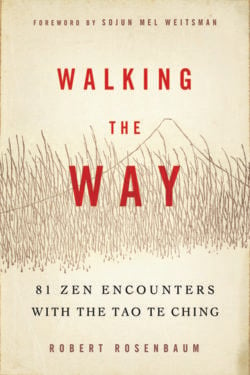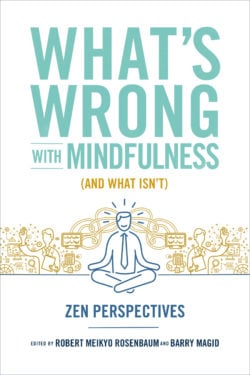Robert Rosenbaum

Robert Meikyo Rosenbaum, PhD, has been a Zen practitioner for forty years and received lay entrustment from Sojun Mel Weitsman of Berkeley Zen Center. Bob is also authorized as a senior teacher of the Taoist practice of Dayan (Wild Goose) qigong in the lineage of Yang Meijun by Master Hui Liu and teaches at the Wen Wu School and the American College of Traditional Chinese Medicine. For thirty years he practiced Zen and qigong while raising a family, trekking the mountains of the High Sierras and the Great Himalaya Trail, and working as a neuropsychologist, psychotherapist, and specialist in behavioral medicine and chronic pain for Kaiser Permanente. Bob is the author of Zen and the Heart of Psychotherapy. He has also been a Fulbright Professor at the National Institute of Mental Health and Neurosciences in India and director of the doctoral training program at the California Institute of Integral Studies.
Books, Courses & Podcasts
Walking the Way
Walking the Way affirms that, like yin and yang, the flowing spontaneity of Tao and the precise simplicity of Zen find perfect balance with one another. Robert Meikyo Rosenbaum brings the two traditions together in a unique presentation that elicits Zen insights from his fresh interpretation of verses from the Taoist classic, the Tao Te Ching. Personal anecdotes illustrate the dynamic potential of Rosenbaum’s approach, skillfully revealing Zen within the Tao and the Tao of Zen. Not only does the author reveal the elegance of each tradition, he shows how their interrelatedness does, in fact, have import on our meditative practices and on our day-to-day lives. Parenting, meditating, dealing with setbacks and illnesses—Walking the Way shows us how to live well in the midst of many complex demands, finding harmony and equilibrium between honing in and letting go, balance between being ourselves and selflessly serving others.
What’s Wrong with Mindfulness (And What Isn’t)
Mindfulness is in fashion. Oprah loves it, Google teaches it to employees—it has become widespread as a cure-all for stress, health problems and psychological difficulties, interpersonal trouble, and existential anxiety. But when mindfulness is separated from the Buddhist tradition, is something lost?
The Zen teachers gathered here each offer a unique perspective on what “mindfulness” means, its strengths, and the potential pitfalls.
- Gil Fronsdal and Max Erdstein thoughtfully explore the rich Pali roots of mindfulness.
- Barry Magid and Marc Poirier examine the unintended side effects of exposing a spiritual tradition to the demands of capitalism.
- Norman Fischer demonstrates how mindfulness informs his creative process.
- Grace Schireson shows how mindfulness allows her to engage fully with the world as a feminist.
- And more, including essays on mindfulness and environmentalism, science, and psychology.
Each chapter offers insights to ground mindfulness in a deeper understanding of both where it comes from, and where it might be headed.


